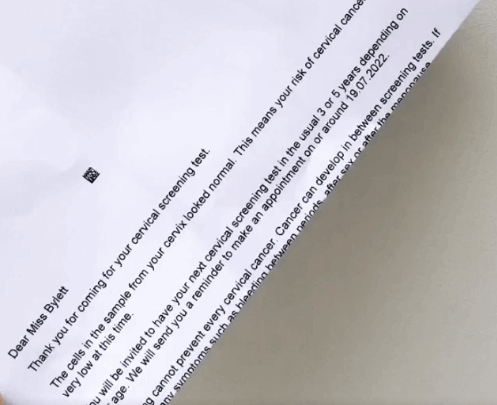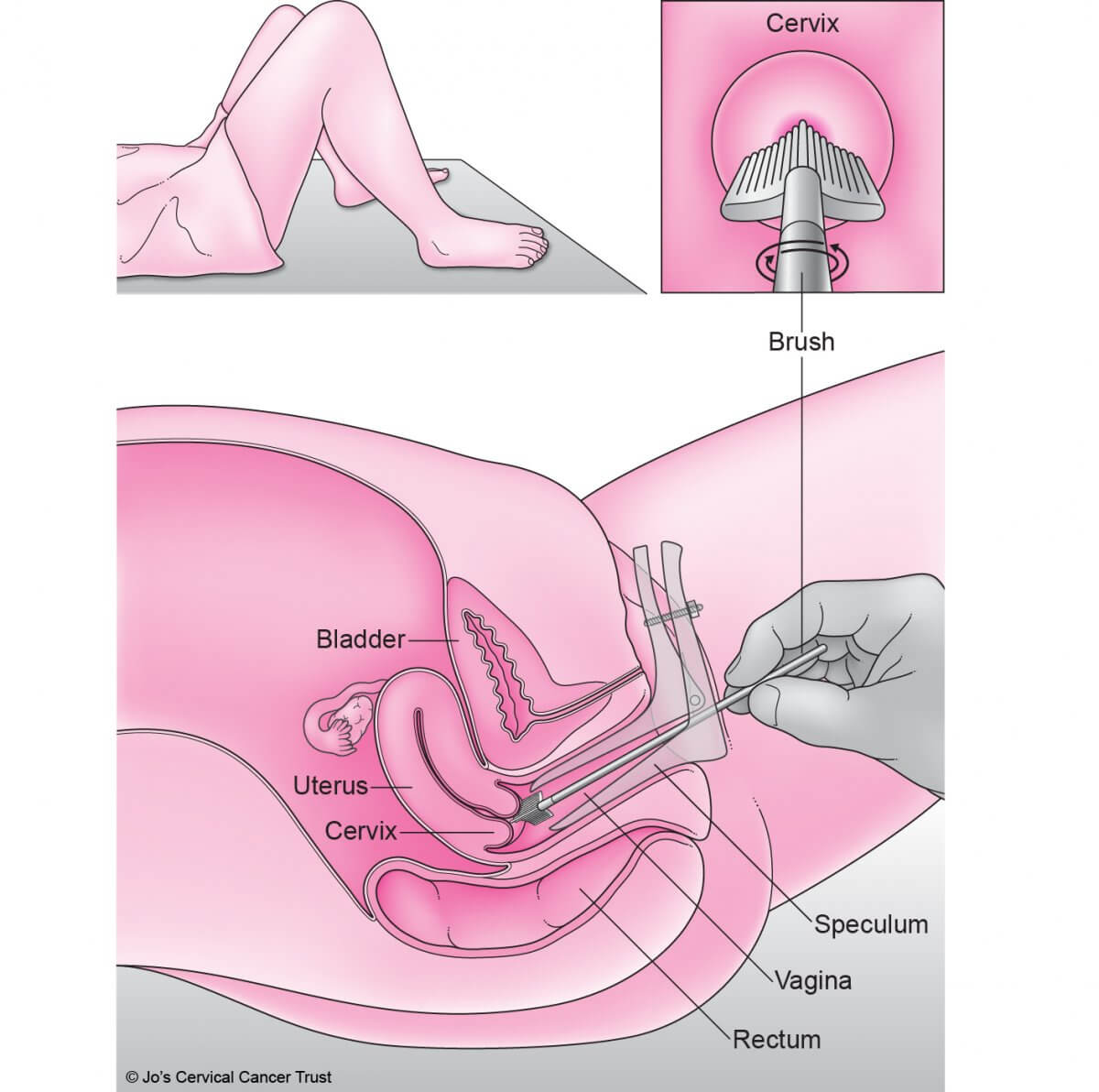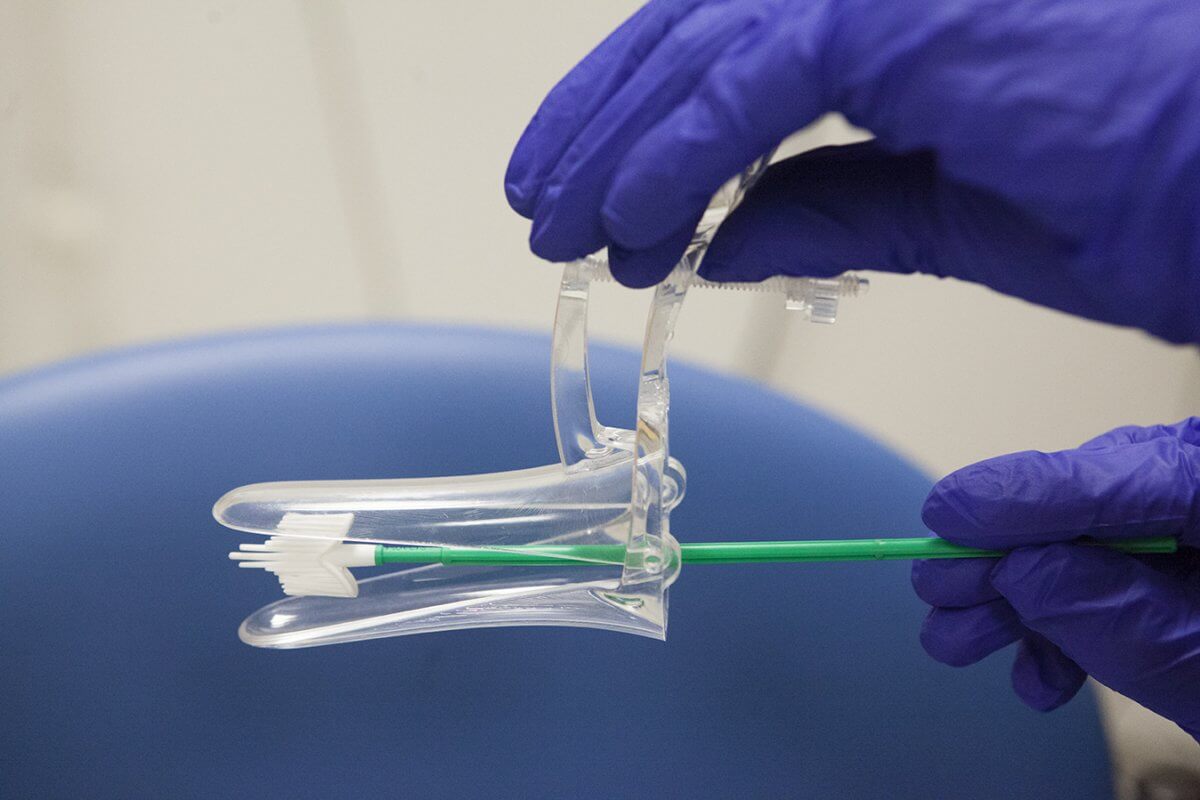My first smear test: what it’s really like and why it’s so important
I recently got that letter in the post, the letter that every female in the UK gets just before or just after they turn 25. It was time to book my first smear test.
I have to admit, booking my NHS appointment was on my to-do list for a good few months before I got around to doing it. Considering we have this free healthcare service at our fingertips, I was crazy not to take it up sooner. A month ago I finally got it done at my local surgery and it was the simplest procedure. My doctor made me feel really comfortable throughout and I was in and out in 5 minutes.
Now I know that’s not the experience everyone has. It completely depends on the nurse you get and the feelings you may have about being in the doctors (the tension you hold) etc. I have to say, I was slightly nervous due to all the negativity on the street that surrounds a ‘smear test’.
It can be really daunting for some people to make the call to book an appointment. From the worry of what will happen in the room to feeling anxious about the results, there are many reasons you might feel slightly anxious about your very first cervical screening experience.
Naturally, if you’ve had any previous traumatic experiences, then an appointment like this can feel even more difficult.
This post is to reassure you that going for a smear test can be a stress-free and pain-free experience.
It’s a completely normal appointment to book, and nothing to feel worried about.


The experience is my own, but a lot of the factual information has come from the NHS and Jo’s cervical cancer trust websites.
Let’s talk: smear tests
What is a smear test?
A smear test, also known as a PAP test or cervical screening, checks the health of your cervix. The cervix is the opening between your vagina and your womb.
Who needs a smear test?
Anyone between the age of 25-64 with a cervix.
Why is cervical screening important?
A smear test is a cancer prevention test. It can help detect changes in cells before cancer develops and well before any other symptoms are noticed.
Around 220,000 British women are diagnosed with cervical abnormalities every year.
There were 854 deaths from cervical cancer in England in 2016.
Smear tests help prevent up to 75% of cases of cervical cancer.
How do I book my smear test?
To book your smear test pop into your GP or give them a call once you’ve received your letter. If you haven’t received your letter but think you’re due a test, phone them up and they’ll be able to look at your medical records and help you from there.
Top tip: If you can, avoid booking your smear test during your period. It can make it harder to get a clear sample of cells.
How long does a smear test take?
The test takes about 5 minutes, and the whole appointment takes about 10. In fact, I spent more time in the waiting room than I did with the nurse.
Who does the smear test?
A doctor or nurse does the test for you. Often it’s a female, and if this is something that you prefer you can specifically request it when you book your appointment.
What happens during my smear test?
“During cervical screening a small sample of cells is taken from your cervix for testing.” (NHS).
Before the test, the doctor or nurse will explain what happens and answer any of your questions. They will also ask you some questions for their paperwork.
Next you undress. There will be a screen and you only need to undress from the waist down. There’ll be a sheet to put over yourself.
Top tip: If you feel self-conscious, you may prefer to wear a skirt or a dress to your smear test. Then you can use that to ‘protect yourself’ and not just the sheet.
The doctor or nurse will ask you to wait on the bed. When you’re ready, they’ll come behind the screen, and they’ll ask you to lie back on the bed, usually with your legs bent, feet together and knees apart. Sometimes you may need to change position during the test.
Top tip: If you don’t feel comfortable lying like this, tell your doctor or nurse. It is possible to do the test in other positions, for example lying on your side.
The doctor or nurse will gently put a smooth, tube-shaped tool (a speculum) into your vagina. If needed, they’ll use a small amount of lubricant.
Relax.
This is the biggest top tip I have! I was a bit nervous when I went and the nurse had a bit of trouble putting the speculum in me. The speculum is small than I expected, and goes in much easier if you aren’t tensed up. (You can ask for a smaller speculum if you feel pain or discomfort).
Breathing exercises might help you here, or switching off by listening to some music or reading something.
In my nurse’s words,
“Relax, I’ve been driving this car for over 30 years and you’ve been lying there for 3 minutes.”
The way she said it made me laugh and the test was over before I’d finished smiling about her comment.
The doctor or nurse will open the speculum so they can see your cervix. Honestly, once it was in, I didn’t feel them do this bit.
Using a soft brush, they’ll take a small sample of cells from your cervix. You can feel this happening, but it doesn’t hurt. It just feels like someone gently scratching your skin, but inside. The doctor or nurse might spend a minute or two doing this to do theur best to get a good amount for the sample.
Finally, the doctor or nurse will close and remove the speculum. Then they’ll leave you to get dressed.
And then, it’s over!


You are in control of this test. Speak to your doctor or nurse and talk to them about how you are feeling and what they can do to help you. If it would help to have company, take someone with you. And if you need to stop the test, just ask.
What happens after my smear test?
After your smear test, you can go about your day as normal! You may experience some light spotting for a couple of hours, so it might be worth having a liner in your bag just in case.
The results arrive by letter, about 2 weeks after your test. Make sure your GP has your up-to-date address!
More often than not, the results are ‘normal’ and you’ll get a letter again in 3 to 5 years for your next smear test.
Sometimes the results are unclear, because there wasn’t enough of a sample to test. You’ll be invited back a few months later to retest.
If the results are ‘abnormal’ you will be invited in for more tests and any necessary further treatment.
Abnormal results do not automatically mean cervical cancer. It usually means that the doctor has found abnormal cells or changes in the cells on your cervix, which may or may not need treatment to prevent cancer. It could have also found changes caused by the HPV virus.
If you have abnormal results, you could be invited back for more regular smear tests to monitor the situation, or a colposcopy, a simple procedure done in hospital which looks at your cervix in more detail.
There is no need to panic until you know if anything is wrong. You cannot change things beyond your control, and adding more stress only strains your body further.
Where can I get more information and support?
- The NHS website have lots of information about cervical screening.
- Jo’s cervical cancer trust have a comprehensive section about smear tests
- My Body Back run screening clinics for victims of sexual violence
- The smears without tears campaign is aimed at people who experience vulval pain
- The LGBT Foundation raise awareness for lesbian, bisexual and trans people who need to get tested, despite what many people think.
- Bloggers Katy and Anna at Hey Mummy live streamed a smear test to show you the process before you go in. Click here to watch it.
- You can book an appointment with your GP to talk about the process and the test, before you book the appointment for your test.
- Speak to friends and family who are older than you and are likely to have had a smear test done before.
Jo’s Cervical Cancer Trust did a cervical screening survey in 2016. Of 3000 25-29 year old women interviewed…
- 63% attended their smear test. 37% didn’t.
- 27% feel too embarrassed to attend cervical screening.
- 72% do not feel comfortable undressing in front of doctors or nurses.
- 25% were worried it would be painful.
I hope this post has reassured any worries you had about your smear test and encouraged you to book that appointment.
Please, please, do not put off getting your smear test done.
It’s not worth the anxiety of waiting! I know it’s easier said than done, but get it over and done with. There’s nothing to feel embarrassed about; the doctors and nurses have seen and heard everything before. They are there to help you. And if the results are abnormal, your doctor will help you cross that bridge when it comes to it.
Have you had a smear test?
What was your experience? Any advice for others about to have one?
Love as always + happy adventuring,
Mollie.






